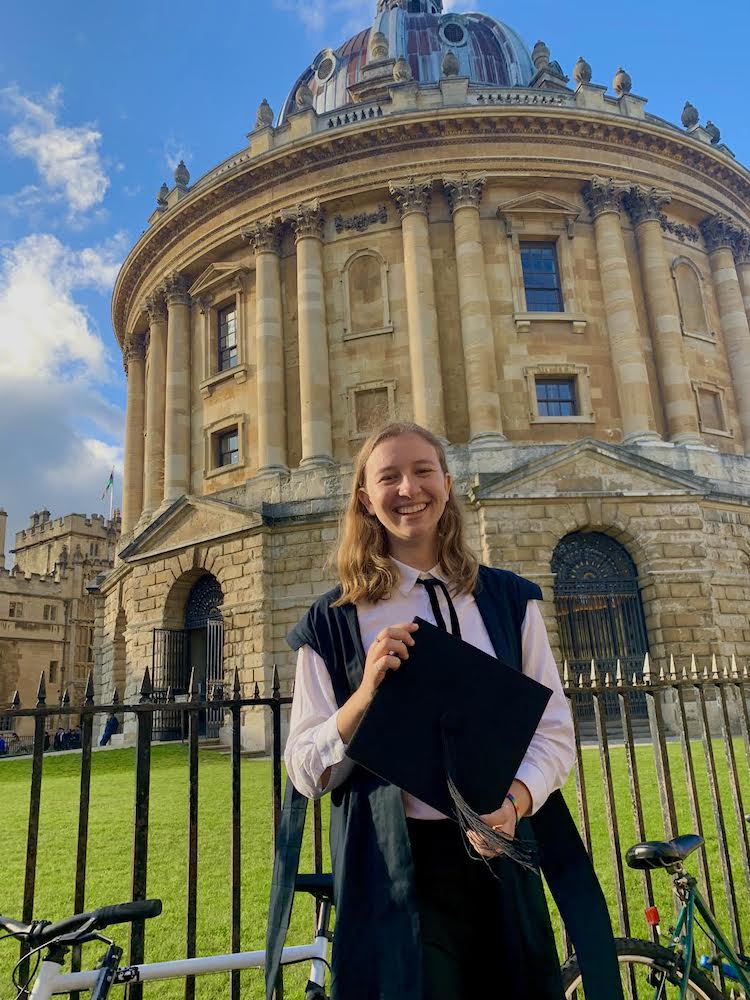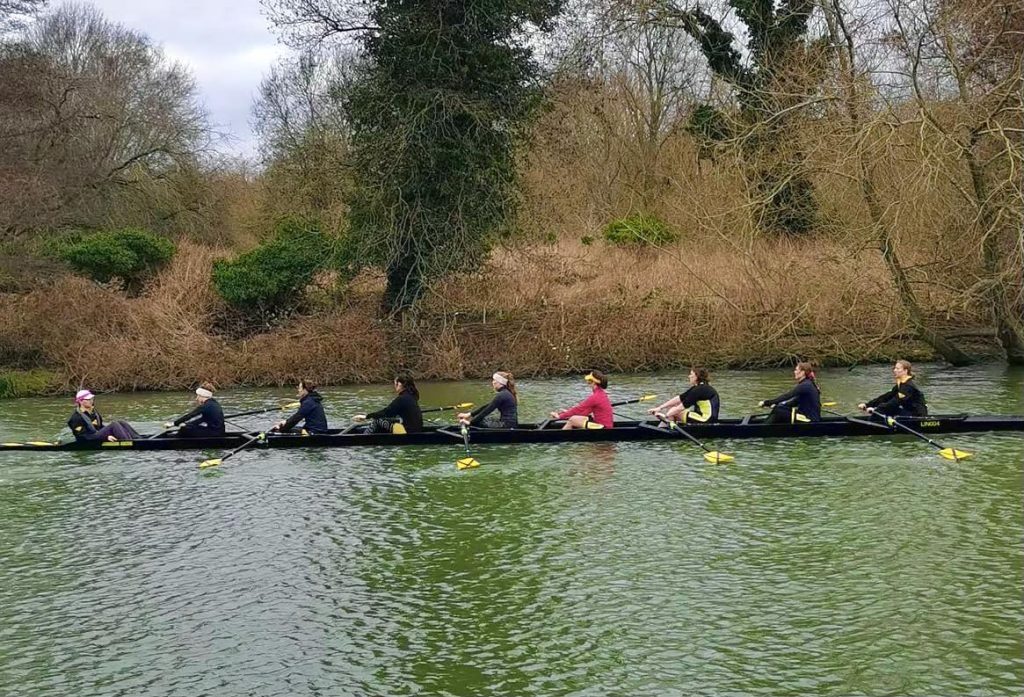Dear Montecito: Emily Stone

This week I met up with Emily Stone, an MUS alumna and current graduate student at the University of Oxford. After earning her bachelor’s degree at Barnard College, Columbia University studying Environment Sustainability and Human Rights, Emily made the move to the U.K. to pursue her passion for conservation science. In our conversation, Emily introduced me to life as a student at Oxford, misconceptions people have about conservation science, and I finally learned what the term “carbon sequestering” means.
Q. What do you study as a graduate student in biodiversity and management?
A. We focus on conservation at large and the biodiversity crisis. It’s very different from the climate crisis, which I didn’t even realize when I began this course. The key issues in biodiversity aren’t necessarily linked to climate change; they’re linked to agriculture, urbanization, and all the things people do that literally destroy ecosystems. Obviously, climate change plays a role in everything, but it’s not one of the top sources, and I think that’s something important to know to understand this area.
What is the biodiversity crisis?
Ecosystems are very complex things. We can think of it at the most basic level: You have the grass that grows, the mice that eat the grass, the bigger cats that eat the mice. These are the most obvious connections, but everything fits together in nuanced ways. When parts of those start to fall away, maybe because a species has very specific habitat requirements and loses that habitat, then all the implications that species has – all the things it eats, all the things it feeds, the diseases whose spread it prevents, the water it cleans – all of that falls apart and makes it so whole ecosystems could disappear. That is bad not only because of the intrinsic value that nature has (some people disagree about that), but also it is bad from a utilitarian perspective. We rely on forests to give us oxygen and trees to filter air and water. If these species start to disappear, we lose all these
ecosystem services.
You can start to see how this gets complex really quickly. Is it hard to talk to people about the issue of biodiversity? What sorts of misconceptions do you run into?
When people think about the climate crisis, they think plant more trees and we’ve fixed it. But no. Obviously planting trees is great, we need to sequester more carbon and restore a lot of the forest we have degraded. There are two primary problems with this, however. The first is that lots of times when trees are planted, it is 1,000 of the same tree. That doesn’t do anything for biodiversity. Birds often need the specific trees that they live in, and different trees need to work together to regulate nutrient levels in the soil. The second major problem is that some environments are not meant to have trees. We just examined a paper in class that was published by a group of forest ecologists. Their argument was that if we transitioned grasslands into forests these areas would be more productive. They argued that we could sequester more carbon and increase biodiversity. But grasslands already have a lot of biodiversity. If you read further in the paper, you see that they measure biodiversity as tree biodiversity, while natural grassland diversity was completely overlooked. Not to mention the fact that grasslands already sequester a lot of carbon underground. Also – there are people that live in that area. They live in a grassland. That is the environment they’ve always worked and with which they’ve long coexisted. The authors completely ignored that side of it. It may be easy to think that planting trees is the solution, but we need to steer away from one-size-fits-all answers.
Carbon sequestering is a term you see so much in this area, but I’m not really sure what it means. What do you mean when you say carbon sequestering?
It is an extremely established fact at this point that we have too much carbon in the atmosphere and that the way in which the natural carbon cycle worked (before we messed it up by burning fossil fuel) is that when plants grow, they take in carbon and build themselves with it. When they die and decompose, the carbon gets released back into the atmosphere. That’s taking out the nuance and a lot of the steps, but broadly speaking that’s what happens. Because we want to reduce the carbon that we put into the atmosphere when we burn fossil fuels, a lot of people look to plants as a solution. Because if you grow millions of trees, they are going to take up that carbon when they grow and store it in their trunks until they die. The same thing happens with algae, which is why a lot of people are talking about algae as a source of carbon sequestering – because algae is really effective at that. But all plants do it. So carbon sequestering is a way of mitigating the climate crisis a little bit. There are also some man-made solutions such as carbon sinks which pull carbon out of the air, but trees and other plants are the natural approach, which is why tree planting takes such a prominent position in so many green campaigns.

Now it is clear that some campaigns prioritize actions such as tree planting while other campaigns stress that we need to interfere in the environment as little as possible. How interventionist do you think we should we be?
My personal opinion is that we have messed things up so much that intervening is necessary. Beyond that I have no idea because intervening can mean everything from planting some seeds and letting them grow to planting seeds in a nursery, transplanting them at multiple stages, and making sure you’re bring in diversity at all different times. A lot of conservation fails at the monitoring process afterwards because it just takes so much time and effort to make sure that the things you do actually take hold. But I still think that we should be doing something.
I want to transition from asking about your program to asking you more about what it’s like being at Oxford. I know you had spent some time in the U.K. growing up because your grandparents are from here, but you moved from New York City to a small English town. It must’ve been a big transition!
Oxford is so, so different from New York! I do miss it. A lot of my friends still live there. I went to visit them over break and when I got back to New York, everything felt so surreal, like Oxford had been a fever dream. But even though Oxford has a lot of quirks and is very different to my life back in New York, it was quite a smooth shift into life in the U.K.
So what is it that’s so different about life at Oxford?
Oxford is weird! It is really its own bubble in a way that’s different from the rest of the U.K. because there are so many international students. But there are lots of things that are different from my college experience in New York. You have to dress up in your gowns for special events. There’s so much jargon to get used to – the academic terms are called Michaelmas, Hilary, and Trinity, for instance. There’s so much more jargon than in the U.S. maybe because of how long the university has been here. And of course the formal dinners. They are really fun. You get to sit in the grand halls in the rooms that look like they’re from Harry Potter. You have to stand up while the professors walk in to sit at the high table, they say something in Latin, and then they bang a gavel and you’re allowed to sit down again. It is a goal of mine to go to formal dinners for as many of the colleges as possible.
What is the most Oxford thing you have done since you moved here?
Rowing! I wasn’t expecting to join. I barely knew it was a thing! Because it’s such a big Oxford thing, the colleges here go heavy on the recruiting at the beginning of the year. I attended what they call a taster session where you go and spend five minutes on the water, and it’s a miracle no one gets hit with an oar because no one knows what they’re doing. It was a mess. But I’m tall, so they convinced me I should stick with it! I needed something to replace ballet, which I had done my entire life but quit this May. Now I have been rowing for about six months, and I love it!
And it is quite an intense new commitment, isn’t it? Even though I know the weather recently must be keeping you off the water.
I know! It has been so rainy – the river here has been too high and fast for most of the year. The big race next week has been canceled, and lots of our other events have been canceled too. We were supposed to have a novice race, but it had to be canceled last minute. Instead we performed it on the rowing machines – the erg’s – so we called it an “Ergatta” instead of a Regatta. And my team came in first! It was my best time ever, but I could barely breathe by the time I got to the end.
But yes, it is very intense. I love it, but I do have an obsessive personality. When I find my thing, it’s my thing. What was originally a two day per week commitment is now every day. But I think it’s great, and I’m looking forward to the Summer Eights race which will hopefully be back on because that is a very high-spirited, classic Oxford event.







You must be logged in to post a comment.